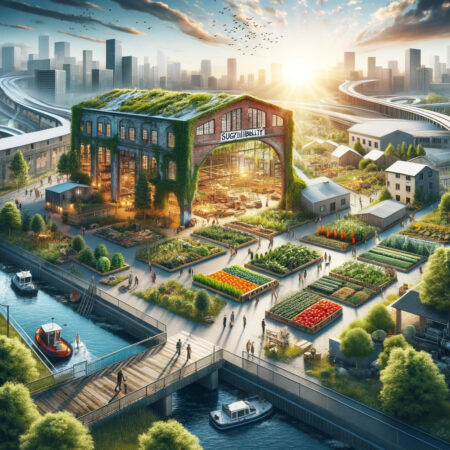Project related to the Master in Interaction Design and Immersive Experiences, Barcelona
My Prompt
Develop a proposal for a sustainable city leveraging gamification, AI collaboration, and Augmented Reality (AR). Inhabitants will work alongside AI systems in daily activities to co-create their urban environment. Utilize AR technology to facilitate inclusive collaboration among residents, addressing local issues and fostering community connections. Prioritize rewards for supporting marginalized individuals. Your objective is to propose a feasible and ethical strategy to tackle overconsumption, climate change, and societal isolation, while ensuring clarity for a broad audience and technical depth for experts.
Organize the report into the following sections:
– mission statement
– the impact (on people, community, culture, the future, ethics, data privacy)
– essential components of the system and a short description for each (limit 5)
– 3 stages to implement the design and an approximate timeline to complete
– necessary team members
– budget range
– conclusion
– a quick story of what daily life would look like for a 13-year old child growing up in a society like this in taipei, taiwan. be as visual and paint a picture with storytelling, incorporating local traditions like night markets, older people exercising in local parks, ect.
Ai Tools: Chapt GPT3.5, leonardo AI
Our Next Decades
**Proposal for a Sustainable City**
**Mission Statement:**
Our mission is to create a sustainable city where inhabitants collaborate with AI systems and utilize Augmented Reality (AR) to co-create their urban environment. By integrating gamification and prioritizing inclusivity, we aim to address local issues, strengthen community connections, and support marginalized individuals, while combatting overconsumption, climate change, and societal isolation.
**The Impact:**
– *People*: Empowering individuals to actively engage in shaping their surroundings, fostering a sense of ownership and community pride.
– *Community*: Strengthening social bonds and resilience through collaborative problem-solving and shared experiences.
– *Culture*: Celebrating diversity and heritage while embracing innovation and sustainability.
– *The Future*: Pioneering a model for sustainable urban development that can inspire global change and adaptation.
– *Ethics*: Upholding principles of transparency, equity, and data privacy to ensure ethical AI collaboration and community empowerment.
**Essential Components:**
1. **AR Collaborative Platform**: A user-friendly AR platform enabling real-time interaction and collaboration between residents and AI systems.
2. **AI-Powered Decision Support**: AI algorithms analyzing data and providing personalized recommendations for sustainable actions and community initiatives.
3. **Gamified Rewards System**: Incentivizing sustainable behaviors and supporting marginalized individuals through a rewards program integrated with AR technology.
4. **Community Engagement Initiatives**: Outreach programs and events promoting participation, inclusivity, and diversity within the community.
5. **Infrastructure Upgrades**: Investments in AR infrastructure to enhance accessibility and usability for all residents.
**Stages to Implement:**
1. **Research and Planning (6 months)**: Conduct stakeholder consultations, research best practices, and develop an implementation roadmap.
2. **Pilot Implementation (1 year)**: Launch pilot projects in select neighborhoods, test AR platforms, and gather feedback from residents and stakeholders.
3. **Citywide Expansion (3 years)**: Scale up the initiative citywide, integrate feedback, and optimize systems for long-term sustainability and impact.
**Necessary Team Members:**
– Urban Planners
– AI Developers
– AR Designers
– Community Engagement Specialists
– Sustainability Experts
**Budget Range:**
Initial Pilot Phase: $2-5 million
Citywide Expansion: $20-50 million
**Conclusion:**
By harnessing the power of AI, AR, and community collaboration, we have the opportunity to build a sustainable city that prioritizes inclusivity, innovation, and environmental stewardship. This proposal outlines a feasible and ethical approach to addressing pressing urban challenges while fostering a sense of community and belonging.
**A Day in the Life of a 13-Year-Old in Taipei, Taiwan:**
As the sun rises over Taipei, young Ming wakes up in his energy-efficient home, greeted by the familiar sounds of the bustling city. After breakfast with his family, he dons his AR glasses and steps outside into a world transformed by technology and community collaboration.
Ming heads to the local park, where he joins older residents in their morning tai chi routine, the park’s green spaces alive with AR overlays highlighting areas for planting trees and community gardens. As he walks to school, Ming encounters AI-powered kiosks offering tips on reducing waste and earning rewards for sustainable actions.
After school, Ming meets up with friends at the neighborhood night market, the vibrant stalls bustling with activity and AR displays showcasing local cultural traditions. They participate in a community clean-up initiative, scanning QR codes to earn points and prizes for their efforts.
In the evening, Ming attends a virtual town hall meeting, where residents gather in AR-enhanced conference rooms to discuss neighborhood issues and propose solutions. Ming shares his ideas for improving local parks and green spaces, inspired by the collaborative spirit of his city.
As he drifts off to sleep, Ming reflects on the day’s adventures and the role he plays in shaping the future of his community. With AI, AR, and community collaboration, Ming knows that the possibilities for a sustainable and inclusive city are endless.



